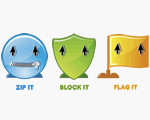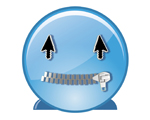 Go to main content
Go to main content
Archive Website of the UK government
Please note that this website has a UK government accesskeys system.
Main menu
Page menu
Parents

Help your child enjoy the internet safely: Click Clever, Click Safe

The internet opens up a world of entertainment, opportunity and knowledge. To help your child to enjoy it all safely, the UK Council for Child Internet Safety (UKCCIS) has developed the Click Clever, Click Safe code.
'Zip it, Block it, Flag it' – a guide to the code
The code has been designed to:
- give parents the confidence to be able to help their children enjoy the internet safely
- help children and young people understand how their online experiences can expose them to risks
The code has three simple actions:
- Zip it - keep your personal information private and think about what you say and do online
- Block it - block people who send you nasty messages and don’t open unknown links and attachments
- Flag it - flag up with someone you trust if anything upsets you or if someone asks to meet you offline
It’s easy to remember when talking to children about online safety and it’s designed to help keep them safe on the internet.
Zip it

Make sure your child knows to always keep private information safe and watch what they say on the internet. People may not be who they say they are online and it’s not always possible to control who can see your child’s information.
Your child should know not to give out information like:
- their full name
- photos
- postal or email addresses
- school information
- mobile or home telephone numbers
- details of places they like to spend time
Make sure your child knows that they shouldn’t arrange to meet people that they have only met online. Even if they have been chatting with someone for a while, that person is still a stranger.
You can help keep your child’s information safe by setting privacy settings. This can restrict access to personal information and photos on things like social networking sites.
You should also encourage your child to use a nickname instead of their real name in chat rooms or on instant messaging services. To stop people accessing your child’s online accounts, encourage them to keep their passwords secret, and to change them regularly.
Block it

Get your child to block people who send offensive messages and tell them not to open unknown links and attachments. They should delete any suspicious emails or attachments as they may contain something offensive or have a virus that can cause damage to the computer.
One of the main ways children can come across inappropriate content online is through search results. Most search engines include a 'safe search' option that excludes results containing inappropriate images or key words.
You can also install parental control software to filter out harmful and inappropriate content for computers and some mobile phones and games consoles.
Flag it

The final rule is that your child should come to you or a trusted adult if they are worried or unhappy about anything they see online. They should also do this if a friend they have made online has asked to meet them in the offline world.
If your child does experience inappropriate content online, report it to the website it appears on. UKCCIS has developed an internet safety 'one stop shop' with more information.
 Facebook
Facebook Twitter
Twitter StumbleUpon
StumbleUpon Delicious
Delicious Reddit
Reddit
